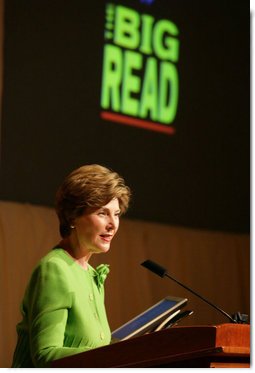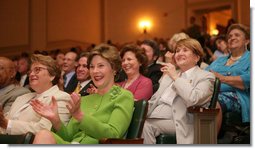|
Home >
News & Policies >
July 2006
|
For Immediate Release
Office of the First Lady
July 20, 2006
Mrs. Bush's Remarks at the Big Read Event
The Library of Congress
Washington, D.C.
10:26 A.M. EDT
MRS. BUSH: Thank you, Anne, for your very kind introduction. I want to thank Anne Radice for her very kind introduction. I also want to thank her for her great work with the Institute of Museum and Library Services. And of course, Dana Gioia, Chairman of the National Endowment for the Arts, thank you very, very much. Dana Gioia has been an excellent Chairman of National Endowment for the Arts. He has really spread the word around our country about how important the arts are to our lives and to our culture. (Applause.)
 And to the Deputy Librarian of Congress, General Donald Scott, thank you
very much. Thank you for your introduction. And to the members of
Congress who are here, who are going to be our readers, thank you very,
very much. Thank you for joining us and for honoring us by reading with
-- your favorite books, reading with us.
And to the Deputy Librarian of Congress, General Donald Scott, thank you
very much. Thank you for your introduction. And to the members of
Congress who are here, who are going to be our readers, thank you very,
very much. Thank you for joining us and for honoring us by reading with
-- your favorite books, reading with us.
I'm delighted to be with all of you here in this venue, the Coolidge Auditorium. Every year, this is where we celebrate the Gala of the National Book Festival, which we launched with the Library of Congress as its sponsor in 2001. Over the last five years, the Festival has brought hundreds of thousands of people to Washington to meet their favorite authors. This year, the Festival will be on Saturday, September 30th, here on the National Mall, and I invite each and every one of you to join us for the National Book Festival this fall.
I'm happy to be here today, though, to talk about another great way to promote American literature: the NEA's Big Read. In 10 cities and towns across the United States, thousands of Americans are being introduced -- or reintroduced -- to the joys of reading literature. They're learning how characters in our favorite stories become close friends that we can visit, just by reopening dog-eared volumes. They're discovering how we can escape to another world by losing ourselves in a good book -- only to find truths about humanity that lead us right back to our own lives. This is good news for American literature -- and bad news for Cliffs Notes. (Laughter.)
The Big Read highlights literature's importance to our culture and our country. Americans, particularly young people, face so many competing demands for their attention -- television, the Internet, and video games -- that keep them from enjoying good books. But it's important for all Americans to read our country's literary classics, because these works define us as a nation, and bring us together -- our people of so many backgrounds -- by expressing our shared ideals.
Unifying communities with the power of literature is perhaps the Big Read's greatest contribution to American cultural life. And in February and March, this power was on full display in the Big Read community of Topeka, Kansas, which adopted Zora Neale Hurston's Their Eyes Were Watching God.
 The librarian at the Topeka Shawnee County Public Library, Marie Pyko,
tells of how the Big Read was truly a community-wide effort. Business
leaders, university scholars, and even Zora's niece, Lucy Ann Hurston,
did their part to get Topekans reading. Drawing on Topeka's local
history, the library held programs with the Brown v. Board of Education
National Historic Site to expand the community's discussions of race in
America, inspired by Hurston's novel.
The librarian at the Topeka Shawnee County Public Library, Marie Pyko,
tells of how the Big Read was truly a community-wide effort. Business
leaders, university scholars, and even Zora's niece, Lucy Ann Hurston,
did their part to get Topekans reading. Drawing on Topeka's local
history, the library held programs with the Brown v. Board of Education
National Historic Site to expand the community's discussions of race in
America, inspired by Hurston's novel.
At Hope Street Academy in Topeka, many of the students struggle with reading. But when their teacher, Janice Feaster, made Their Eyes Were Watching God a core part of the curriculum, the students, completely absorbed in the story, became excited about literature. Debates about the novel showed that new technologies are not at odds with literature: the Hope Street students hosted their debates on a blog.
At the library, in schools, in government offices, at businesses, among civic groups, and in churches, Topekans from every walk of life came together by reading the same good book. Marie remembers how the excitement reached the local beauty shops, as Their Eyes Were Watching God quickly replaced Us Weekly as the favorite discussion topic across the manicure tables. (Laughter.)
Topeka is a terrific example of how the Big Read can restore literature to the center of American community life. And next year, thanks to the NEA and federal partners like the IMLS, the Big Read will spread to more than 100 communities across the United States, and add four more American literary classics to its book list.
As the Honorary Chair of the Big Read, I'm delighted with this initiative's next chapter. And I look forward to working with members of Congress as they bring the Big Read to their districts.
In the meantime, thank you all for coming. Thank you for your commitment to the arts. And thank you for supporting the Big Read. (Applause.)
END 10:32 A.M. EDT


